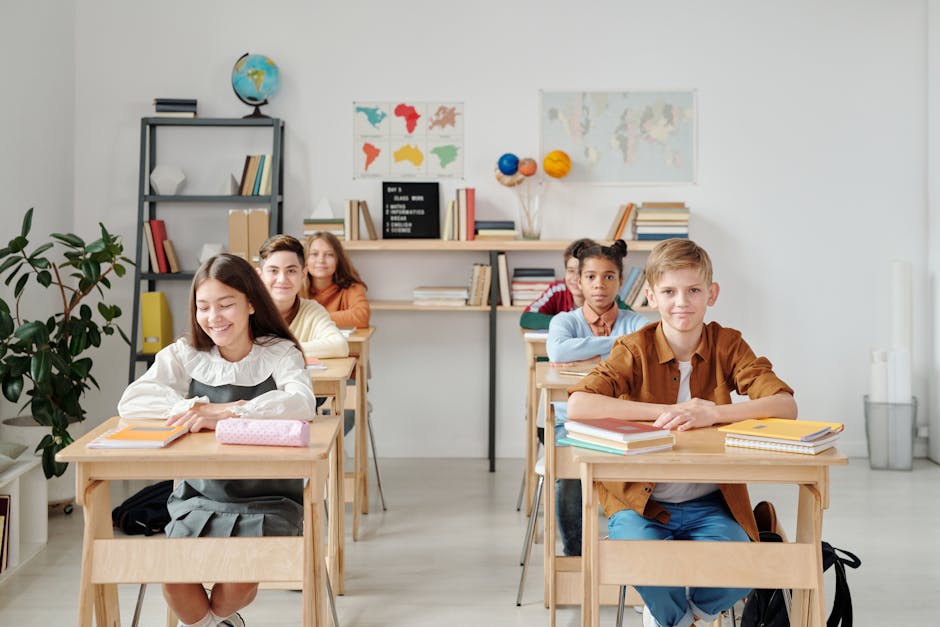Do Public Schools Have Gifted Programs
Public education is a topic often rich in debate. Where do gifted programs fit into the grand scheme of public-school education?
There is a preconceived notion that public schools generally do not cater to gifted children, often leaving them feeling underserved and unchallenged. But is this entirely true, or merely a long-standing myth in the world of education?
In this article, we delve into the topic of gifted programs in public schools, their availability, effectiveness, and the challenges faced in their implementation.
Join us as we uncover realities, debunk myths, and enhance our understanding of how public schools are assisting (or on the contrary, neglecting) the needs of high-potential students.
Stay tuned for illuminating insights and comprehensive discussions on this prevalent topic.
The Purpose of Gifted Programs

The primary purpose behind gifted programs in public schools is to nourish the exceptional intellectual capacity and creative talents of highly capable students. These programs serve as a platform to challenge students beyond the average curriculum.
Engagement with advanced academic materials and stimulating activities empowers the students to push their learning boundaries. Experts believe that these programs cater uniquely to talented students, helping them keep engaged and motivated in their educational journey.
Furthermore, they aid students in growing both academically and emotionally by encouraging critical thinking , creativity, leadership qualities, and intellectual curiosity. Moreover, they fuel a passion for learning, paving the path for future success.
Gifted programs, thus, recognize this segment of students and deliver a specialized environment to let their capabilities flourish.
Identification Process for Gifted Students

The identification process for gifted students varies across public schools . Typically, it encompasses a combination of teacher recommendations, standardized test scores, and other pertinent evaluations.
Teachers play a vital role in this process. They identify potential gifted children based on classroom performances and behaviors passionate curiosity, accelerated learning, high levels of creativity, and the ability to learn and apply information rapidly.
Standardized test scores serve as a quantitative measure of a student's abilities. A high percentile rank often signals giftedness .
The evaluation extends beyond academics . Cognitive abilities, creativity levels, leadership skills, and other areas of talent are considered. Often, a professional psychologist will be involved to ensure a comprehensive evaluation.
It's important to remember, this process is not a one-size-fits-all approach. What works for one student might not necessarily work for another. Identifying gifted students is a sensitive, yet critical task.
Prevalence of Gifted Programs in Public Schools

The prevalence of gifted programs in public schools varies largely by district, state, and even country. In many well-funded school districts, you can find solid gifted and talented programs that provide challenges and stimulation to the brightest students. Studies suggest that nearly 70% of public schools in the U.S offer such programs. However, the numbers vary sharply in rural, urban, and suburban schools.
In less affluent districts, gifted education can be less rigorous or even non-existent. It's all too common for these bright students to get lost in the crowd due to lack of resources. But numerous advocacy bodies and non-profit organizations are tirelessly working to equalize these disparities.
Statistics may paint a hopeful picture, but there is still a lot of work to do to ensure every gifted child receives the right kind of support and education.
Variety and Scope of Public School Gifted Programs

Public school systems across the country have started to recognize the necessity and importance of curating tailored curriculum for highly intelligent students. Varied in nature, these 'Gifted Programs' ensure the adequate mental stimulation these students yearn for.
Typically, these programs fall into two broad categories: pull-out and full-time. Pull-out programs remove gifted students from their regular classes for a few hours a week, offering enhancement activities. In contrast, full-time programs have a specialized curriculum throughout the school day.
Scope also varies vastly, spanning a range from core subjects like math and science to eclectic modules like leadership and critical thinking. Some also offer Advanced Placement or International Baccalaureate programs, giving students a collegiate edge.
As public school systems continue to evolve, so do their gifted programs, presenting a much broader educational landscape for our nation’s gifted youth.
Public vs Private School Gifted Programs

In comparing gifted programs, stark differences between public and private schools appear. Public schools typically appeal to broad student demographics. As such, their gifted programs are often underfunded, with less diverse course offerings . However, they do offer inclusivity and diversity that helps nurture social skills .
In the private sector, gifted programs are more individualized, employing intensive teaching methods and curricula tailored towards high-achievers. With typically smaller class sizes , the student-teacher interaction is stronger and more personalized. However, tuition costs and limited seats restrict accessibility .
The challenge then isn't about public vs private, but finding the optimal environment that fulfills your child's need. Thus, either institution may serve your gifted child better depending on their specific needs. Thorough research is recommended in making this important decision.
Exploring Benefits of Public Schools' Gifted Programs

Public schools' gifted programs offer an array of advantages that greatly benefit gifted students . One key benefit is that these programs provide a stimulating and challenging environment for intellectually gifted learners.
This not only helps in nurturing their creativity and intellectual curiosity but it also fosters academic excellence . In such an environment, students are encouraged to think critically, solve problems efficiently, and gain in-depth knowledge.
Moreover, these programs cater to their emotional needs too. Gifted students often feel isolated in regular classrooms due to their different learning pace and capabilities. But in gifted programs, they interact with like-minded peers which helps in building their social skills and self confidence.
In essence, public schools' gifted programs play a crucial role in the holistic development of gifted children.
Criticisms and Concerns of Gifted Programs

While gifted programs provide targeted instruction , critics argue they cater to a privileged few. Detractors express concerns about access, as selection processes often favor students from affluent families due to biases within aptitude tests and teacher referrals.
Moreover, stigma attached to non-selected students can foster unhealthy competition. Issues of segregation, fostered by separating gifted children from their peers, also persist.
Lastly, critics assert that rather than packaging education one-size-fits-all or bifurcating it into standard vs. gifted, educators should aim to accommodate all learners’ needs within inclusive classrooms where diversity of thought is cultivated.
Given these criticisms, there is a growing urgency to reassess how, why, and for whom gifted programs are implemented. Fair procedures, equitable access, and rigorous curricula can ensure the healthiest environment for all students.
Success Stories from Public Schools Gifted Programs

Every day, gifted programs in public schools are responsible for success stories across the nation. Let's take Jessica, a prodigious mathematician at just 13. Thanks to the advanced curriculum of her school's gifted program, she just won a state- wide math competition , proving that talent can indeed be nurtured into something extraordinary.
Or consider Alex, who transitioned from average to exceptional in his creative writing skills. With the help of his school’s gifted program, he recently published his first book before even turning 16 .
Now, let’s talk about Mia, an extraordinary musician identified and polished through her public school's gifted program. At 17, she's already playing alongside the city's best orchestra.
These are just a few anecdotes; there are countless such tales of talents recognized, nurtured, and optimized via public school’s gifted programs.
